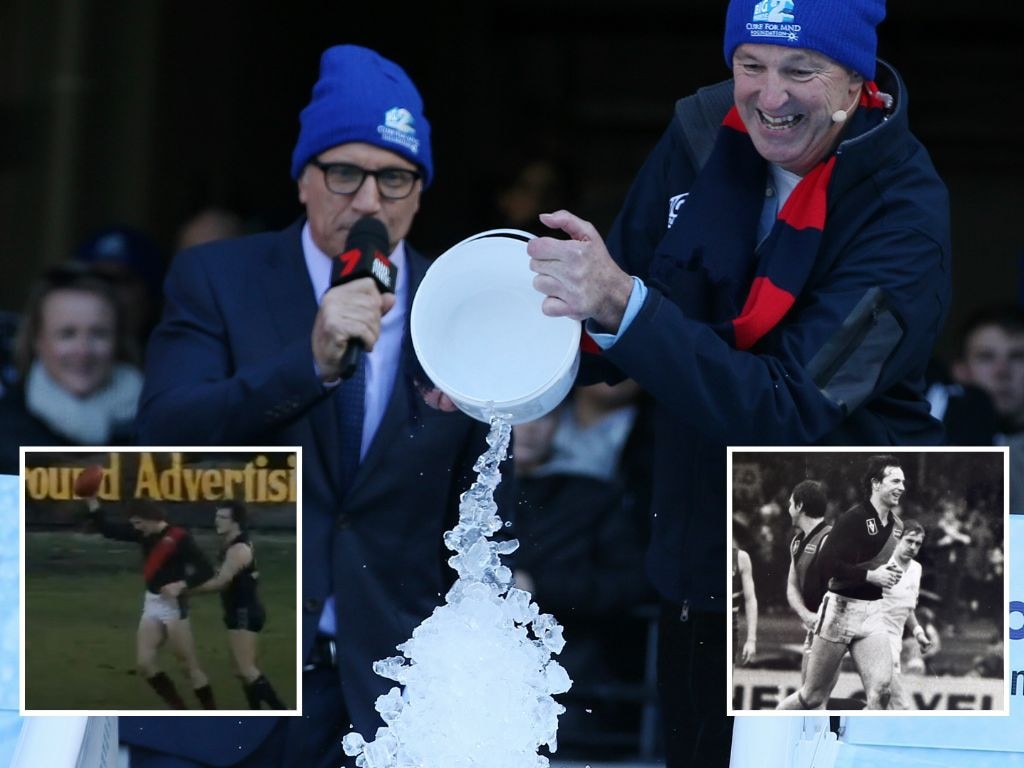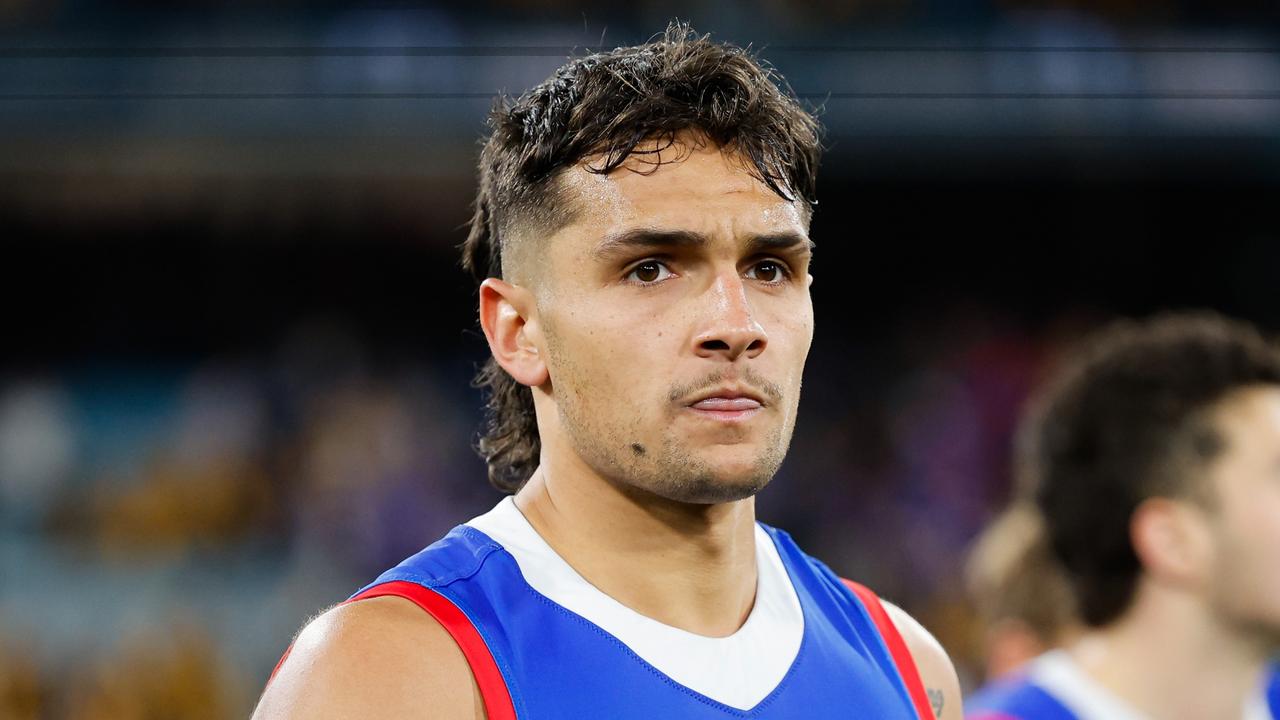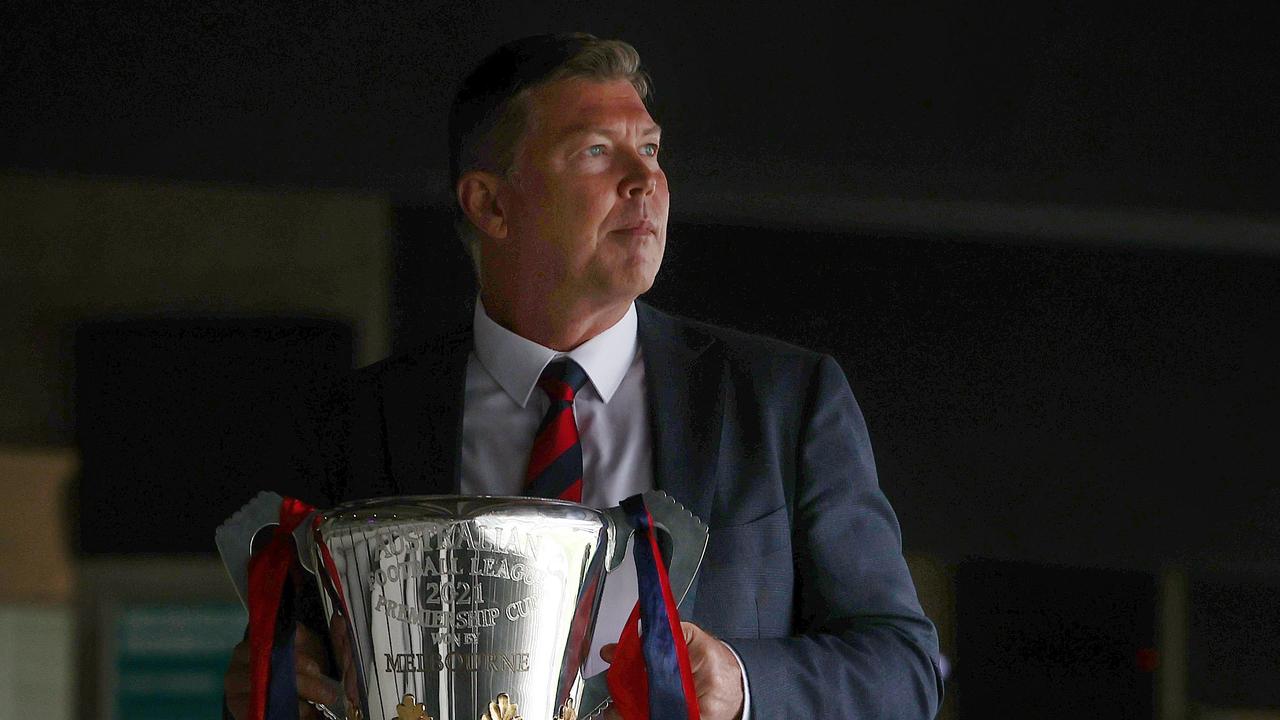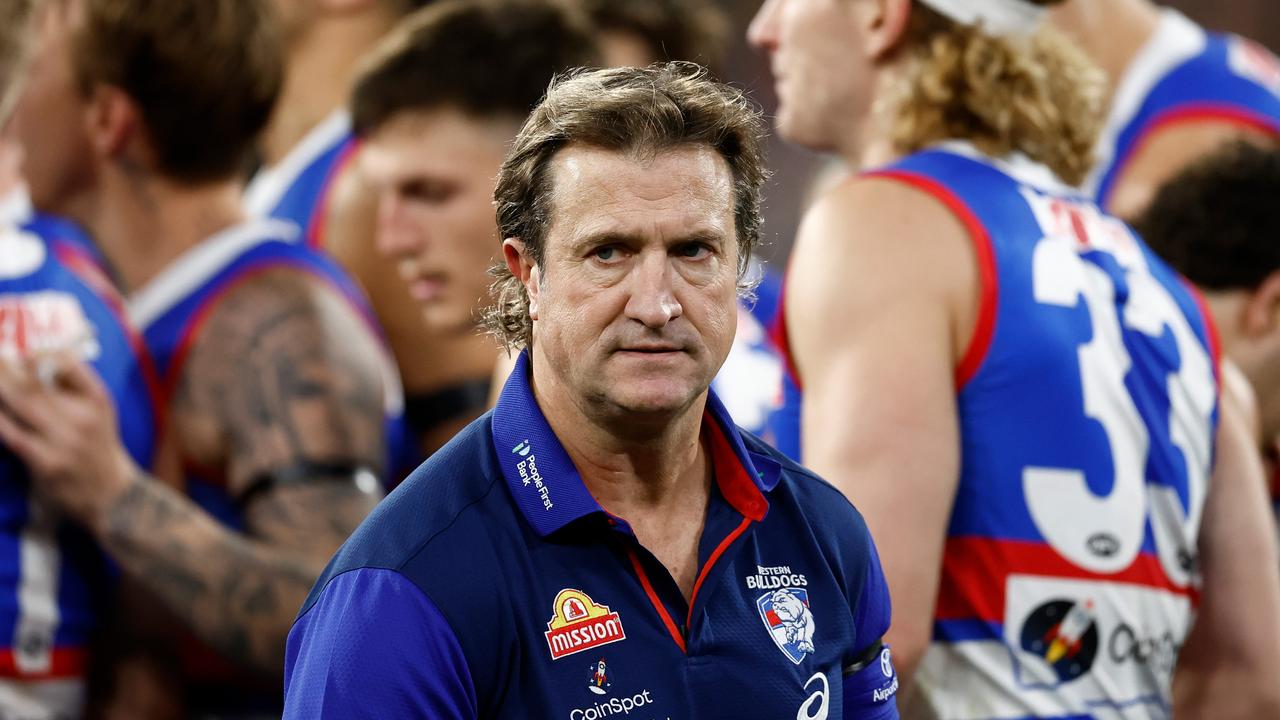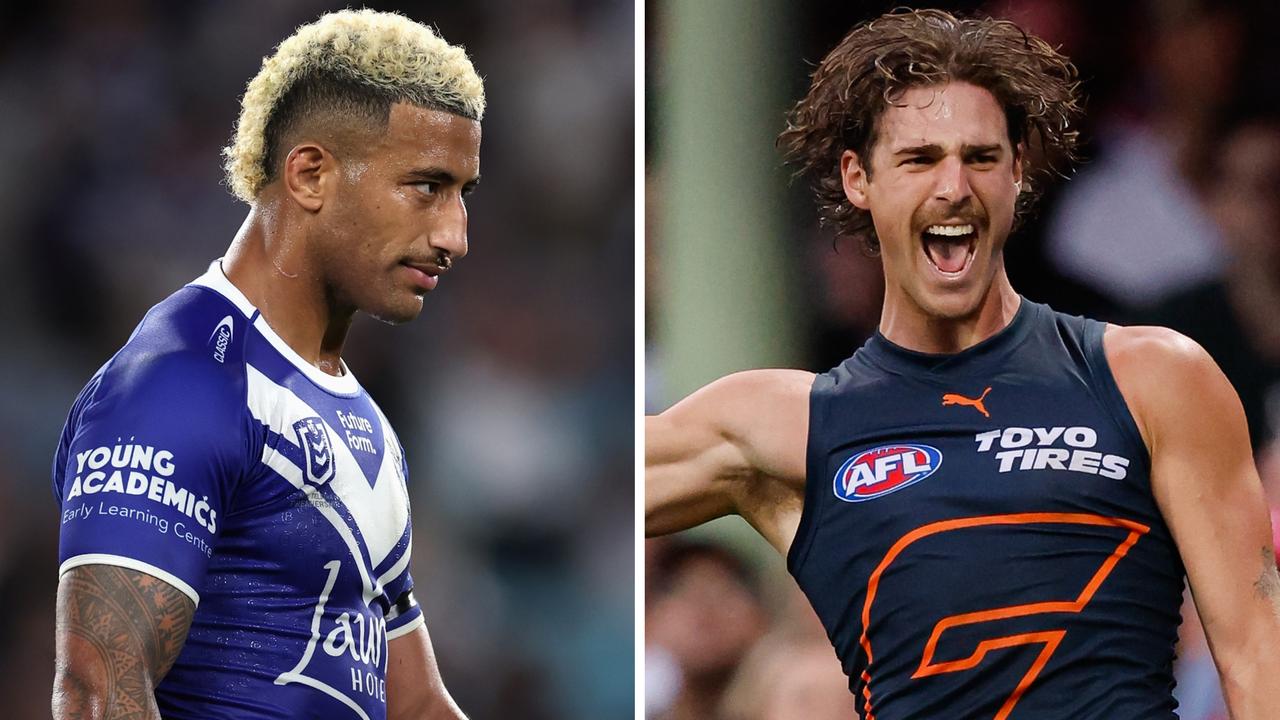Budding superstar Paul Salmon’s footy career and life were changed by a knee injury 40 years ago
Forty years ago, Paul Salmon threatened to redefine Australian football as a giant goalkicker. He talks to SHANNON GILL about whirlwind stardom wrapped in tragedy, the moment it changed and its complex legacy.
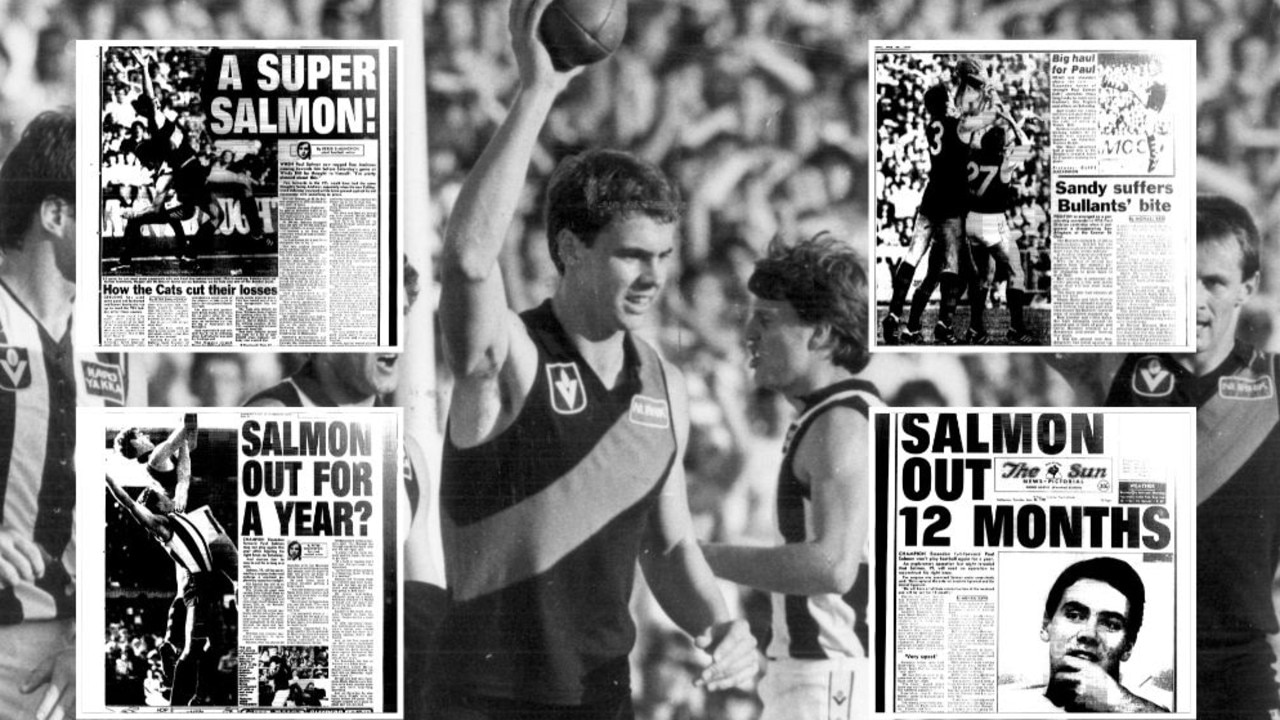
AFL
Don't miss out on the headlines from AFL. Followed categories will be added to My News.
There’s an old Bomber who knows a little bit about what life’s like for suspended Eagle Harley Reid right now.
To be called a superstar at 19.
To be labelled a generational talent that could change the game.
“I’m excited watching Harley Reid play,” Paul Salmon tells CODE Sports.
Without wishing an ill omen upon Reid, Sunday is the 40th anniversary of the event that changed everything for Salmon. In retrospect, it derailed the superstar route yet perhaps taught him more valuable life lessons.
“I was getting headlines like, ‘next million dollar player’,” Salmon remembers.
“Before my knee.”
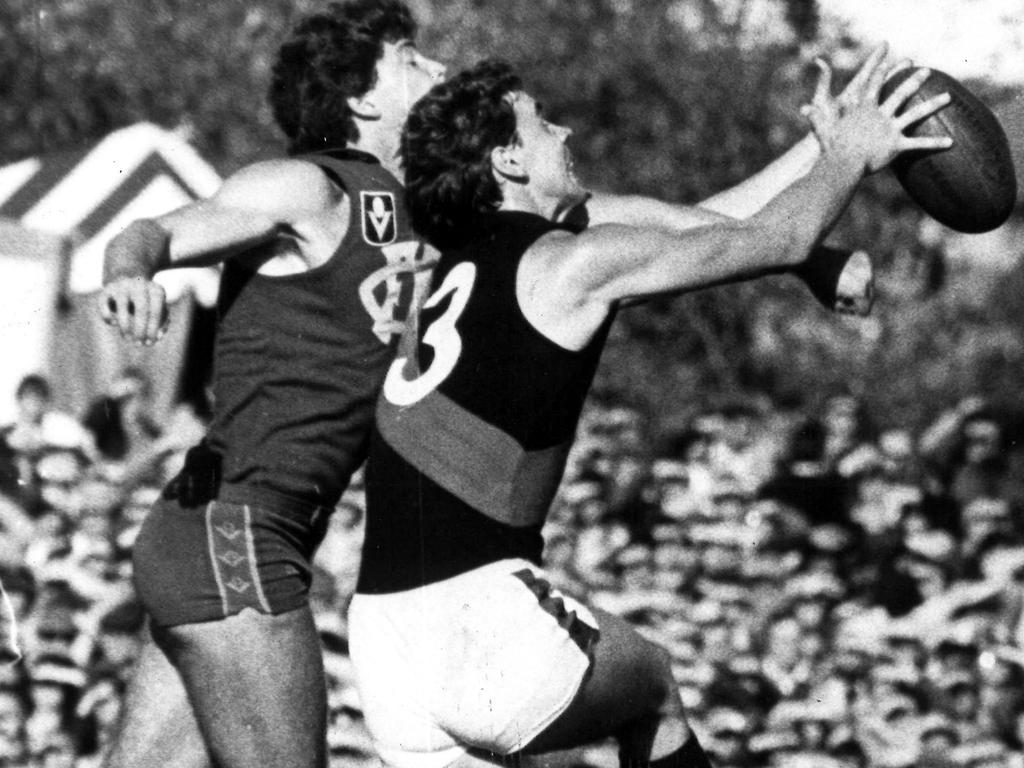
The new Coleman
Going into 1984, the 19-year-old Salmon had nine VFL games under his belt and was trying to break into an Essendon team fresh from a grand final.
“I wasn’t even a shoo-in for a game, let alone having an idea about what was to come,” he says.
Picked at full forward, he started with seven goals, an early contest filling his 206cm body with confidence.
“I had one arm pinned and I took a one-hander at the top of the goal square,” he remembers.
“At that moment, these sort of mythical wings started to feel like they’re attached to my back.”
Playing in front of an adoring throng in the Dick Reynolds Stand at Essendon’s Windy Hill, those wings set him flying for a while. Within three weeks, he was the toast of the football world; 22 goals in the first three games of the season and nine Brownlow Medal votes to go with them.
“This quietly spoken forward-ruckman has taken everything in his (huge) stride during the past three weeks, rocketing himself into football stardom,” wrote the Sun’s chief football writer Peter Simunovich, after interviewing him in the back of a taxi fresh from eight goals against Collingwood
“The safe marking and highly-gifted player has won himself an audience and following comparable to the days when Peter McKenna, Peter Hudson and Alex Jesaulenko were the heart-throbs of Melbourne.”
Teammate Merv Neagle was even more effusive.
“How are they going to stop him?” he told Channel 7. “Maybe he’s another (Bomber legend) John Coleman, he’s just a freak.”
Neagle had a very good point; 206cm made Salmon the equal-tallest player in league history in 1984.
The idea that someone of that size could be anything other than a lumbering ruckman with limited skills seemed fanciful before Salmon’s emergence.
As much as his goal kicking exploits were impressive, the sense that he may have be redefining the way the game was played consumed football fans.
In the NBA this year 7’4” rookie Victor Wembanyama expanded people’s minds as to what is athletically possible with a big man.
Forty years ago, ‘The Big Fish’ was footy’s own ‘Wemby’.
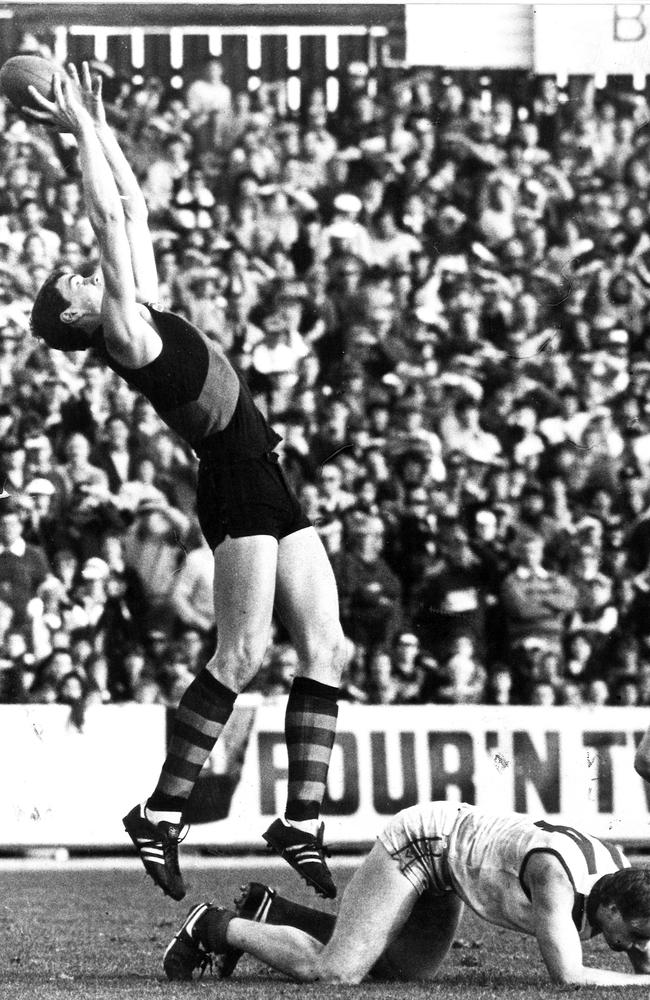
“There wasn’t any real reference point for my type of full-forward, so there was a big novelty to that,” Salmon says.
“I had the attributes of a shorter player because I was quite quick and I could take the ball at my feet and I could turn sharply.”
In coach Kevin Sheedy, Essendon had a boss who was pushing the boundaries with adaptability of position play. Salmon was the ultimate experiment for the mad scientist.
“Sheeds had sort of changed the way the game was being played and here’s this six-foot-nine circus act coming out of the goal square.”
After 12 games, Salmon led the league’s goal kicking table with 60. The Bombers were destined to play 25 games that season, so a century of goals seemed a formality.
And he was no flat track bully.
In those 12 games, he seemed to lift a gear against the best teams. Hawthorn (7 goals), Collingwood (8), Carlton (7) and Fitzroy (7) filled out the five finals positions with the Bombers that season.
Overnight sensation
The awkward kid from Ringwood was now Paul Salmon, ‘Superstar’.
“One day I was the tall gawky guy in the corner, then I was being waved past the nightclub line, given a drink card and a little area to yourself with your mates inside …. girls who wouldn’t even look at you the day before are now going, ‘Give me a piece of that’.
“Everything you dream of as a kid playing league footy and all the trimmings that go with it was realising itself inside a matter of days and weeks.
“I’d be lying if I said that it wasn’t fun and exciting, but I had no idea of the impact that window would have on my career, let alone my life.”
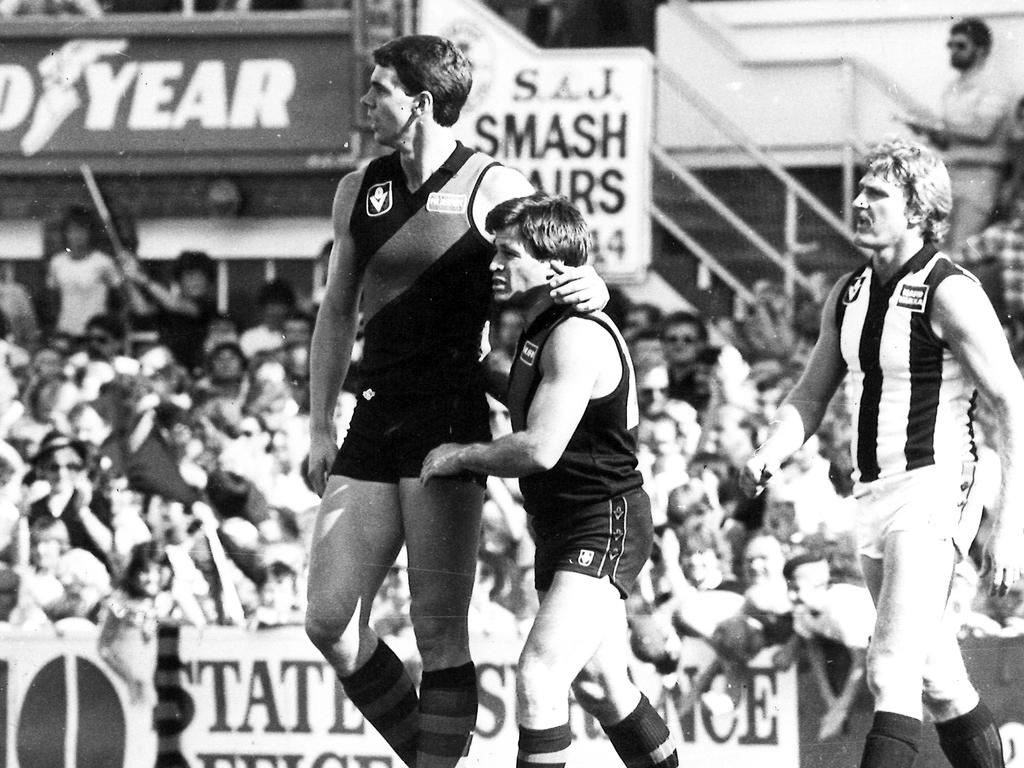
Behind the glamour there was a tragedy that played a significant role in the overnight sensation.
Salmon’s best mate coming through the ranks was another Bombers hopeful named Gary Syme. They’d travel across to Windy Hill together from their eastern suburbs homes and in some ways, he was Salmon’s idol in those formative days playing under-19 football.
“He was a super athlete, six-feet-four and a very good player. He was a handsome young bloke and he had charisma – he had everything I didn’t have,” Salmon says.
Syme took his own life over the summer of 1983-84. As Salmon came to grips with losing his mate, he channelled the confusion into his football.
“I took a long time to try and work out what happened there and it’s complex. Athletes get their motivations from different places and so I trained so hard in the ’83-84 summer because I wanted to do it for him.”
“I knew I was gone”
In round 13, 40 years ago this Sunday, Salmon had three first-half goals. Taking his regular run in the ruck, he was turning a close game with Collingwood squarely in Essendon’s favour.
As he took the ball from a bounce and cleared the ball downfield, Collingwood’s Geoff Raines tried to smother his kick.
“My leg snapped around him then all of a sudden you’re lying on your back and you’re looking at the sky wondering what’s just happened.”
“Salmon is down at centre field,” said a panicked commentator Peter Landy, with the urgency reserved for something major.
“My knee was just sort of swaying,” Salmon says today. “It had no stability in it, so I knew I was gone.”
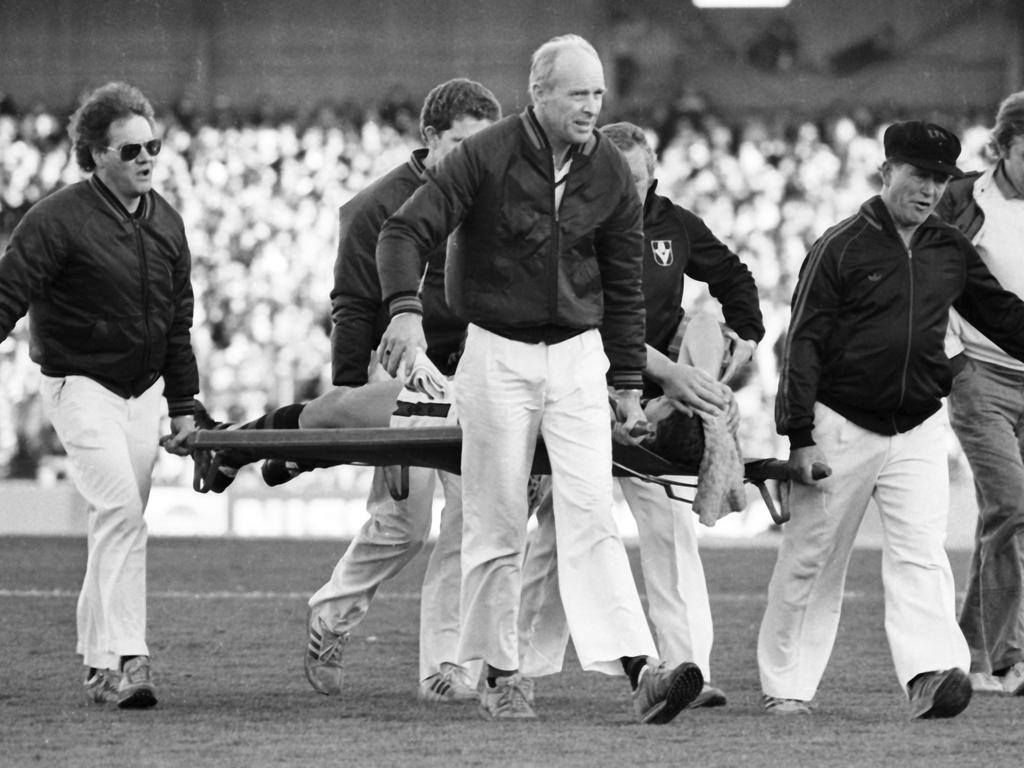
When the news was confirmed a few days later that both his anterior cruciate and lateral ligament were ruptured, he broke down and cried in front of his coach. The injury dominated newspaper headlines; players didn’t come back from knee injuries like that back then.
Salmon was told the operation would be an Australian first; they’d fix his cruciate and then add a supporting fibre cord to act as another ligament.
“The surgeon said, ‘You’d have to get hit by a tram to do your knee again. But there’s no way I can promise you will play again’.”
His 63-goal season curtailed before an inevitable century but there were bigger doubts on the biggest thing to hit league football in years.
“The football world fears Salmon’s brief career might have been cut short like Essendon’s greatest full forward John Coleman and Hawthorn champion Peter Hudson,” wrote Michael Davis in The Sun.
It changed Salmon in all sorts of ways.
First, he lived through the mixed emotions of watching his teammates win a premiership, where he was even awkwardly included in the grand final parade.
Then there was the upside.
Instead of enjoying the worship of a city, he grew up quickly and took control of his life for the future.
“Lying on the ground in Round 13, I thought, ‘I can’t trust this game’.”
While doing rehab the following year, he bought a gym business with his father. The next year he got married. The year after that he welcomed his first child.
“Football was not going to be the anchor anymore.”
“It just became a job”
Salmon’s comeback from the knee injury appears a fairytale triumph, yet it is complex.
He kicked six goals in a premiership win the following year, then another six in the 1993 Bombers flag.
There were extraordinary days with big bags of goals and starring roles for Victoria in state football.
“But it wasn’t always a bed of roses because beyond ’84 there was the burden of expectation,” he says.
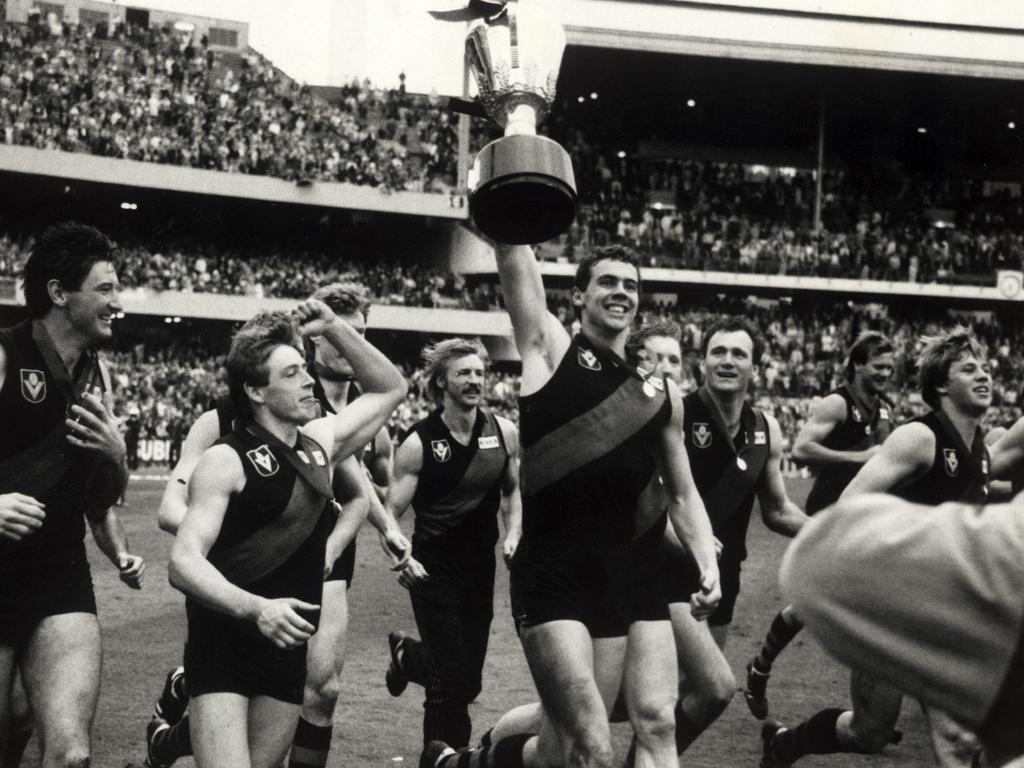
He could never quite replicate the sensation of 1984 due to the physical changes, which fans struggled to understand. For one, he was unable to straighten his knee for two years and he admits that his great weapons as a forward were diminished.
“A lot of my goals came from leading (in 1984), and I probably lost a yard of pace. Before I could rely on my speed and then my turning circle and turning time, so my sharpness just dropped off exponentially as well.”
The other factor was the string of soft tissues to his hamstrings and calves that were a consequence of the knee reconstruction. He became that maligned term: injury-prone.
“I had my own expectations too that were compounded by fans and people within the club. When they weren’t being met it was a heavy, heavy burden,” he says.
“I think by today’s standards, I probably would have taken some weeks off with mental leave. I fell out of love with footy, but I had a mortgage and a family and I needed it.
“But it just became a job for a period of time”
Salmon was not the archetype macho footballer of the era, he was a thinker and dealt with self-doubt. That he decided to focus on his family life with wife Jo was crucial to him not being overwhelmed.
“I met this wonderful woman and we’ve been married nearly 38 years now. It would have been very difficult without her as I nearly didn’t survive emotionally.”
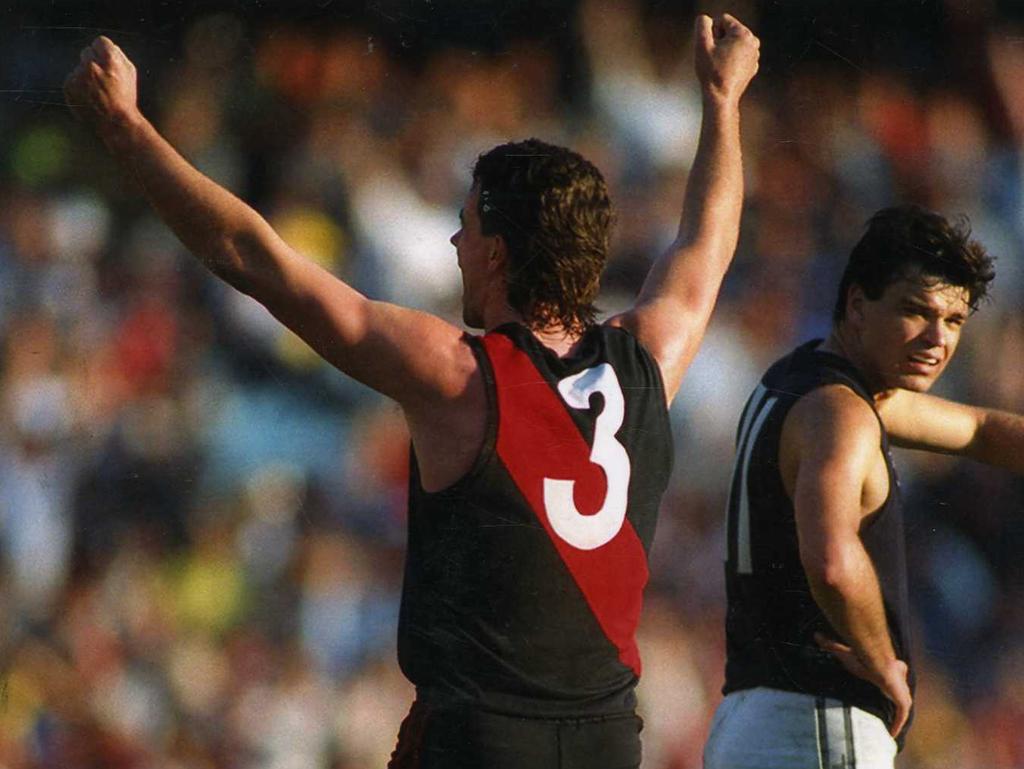
Hall of Fame career
The low point of Bomber expectations was limping off in a losing final in 1995. Fans jeered and the Fish knew his time was up.
A most unlikely lifeline was thrown by his childhood team Hawthorn and things changed. There were no expectations and he started smiling again.
“I remembered what it was like to play football as a nine-year-old again,” he says.
Unburdened, he ran around reborn in the ruck and won two best and fairest awards. Ultimately he was named in Hawthorn’s Team of the Century and in the commemorative painting, he’s next to his childhood hero Peter Hudson.
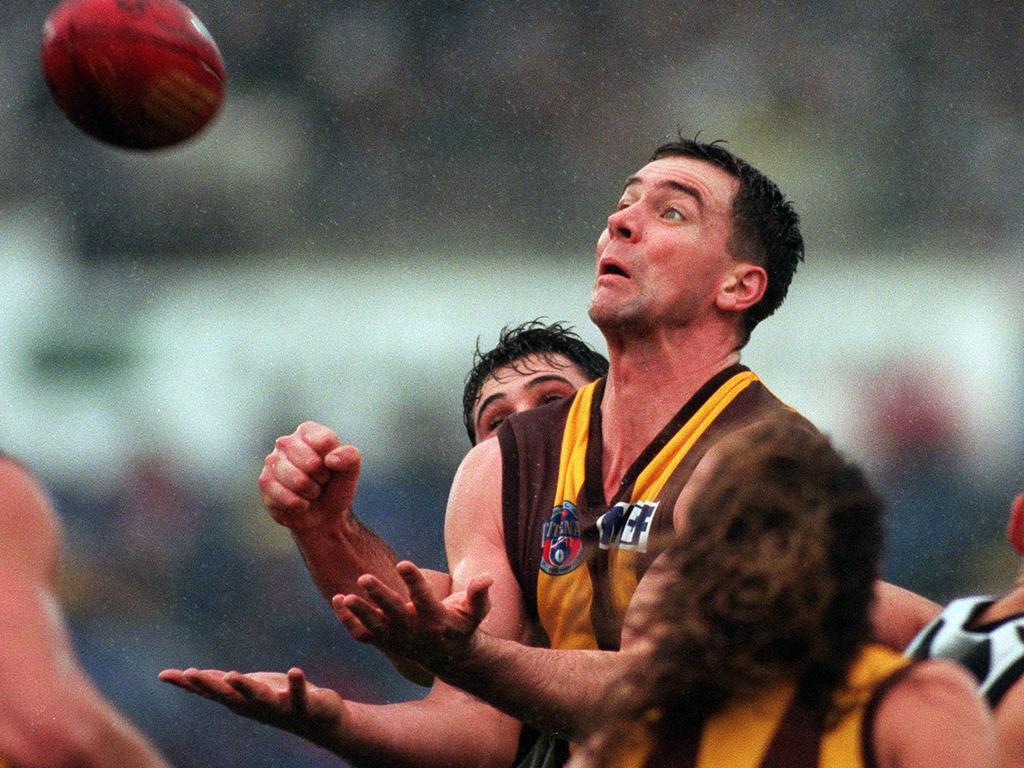
Later he was inducted into the Australian Football Hall of Fame. He is likely the only VFL/AFL player to reach 300 games after having a knee reconstruction.
This week at the Hall of Fame dinner, Salmon mixed with old Essendon mates as well as old Hawthorn mates.
It’s a time for looking back and given the 40th anniversary, there is an unanswerable what-if around Salmon.
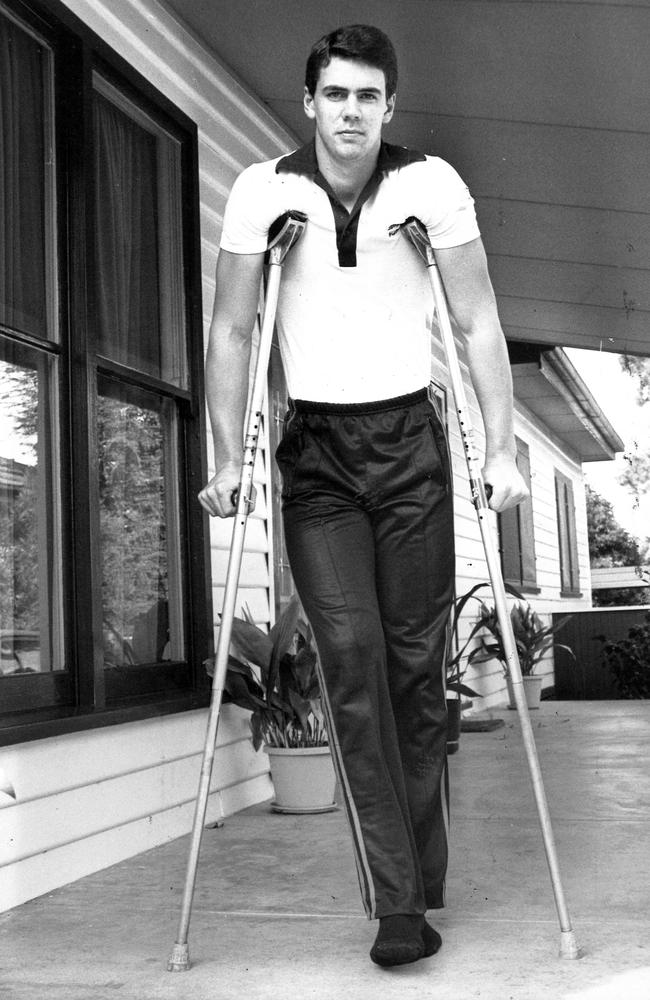
If not for the knee injury, would his goal kicking exploits have stood alongside names like Ablett, Lockett, and his eventual teammate and this year’s Legend Jason Dunstall?
Given the events of 1984, it’s not hard to imagine him having an even more imposing record.
Yet for all that, Salmon is not bitter about his misfortune. He has premierships, a swag of memories and a lot of lessons.
“That whole year was the only reason I played as many games as I did, because of what I learned and how it moulded me.
“I don’t reflect on ’84 as a ‘woe is me’ tale, I jammed 10 years of growth into one year.”
More Coverage
Originally published as Budding superstar Paul Salmon’s footy career and life were changed by a knee injury 40 years ago



